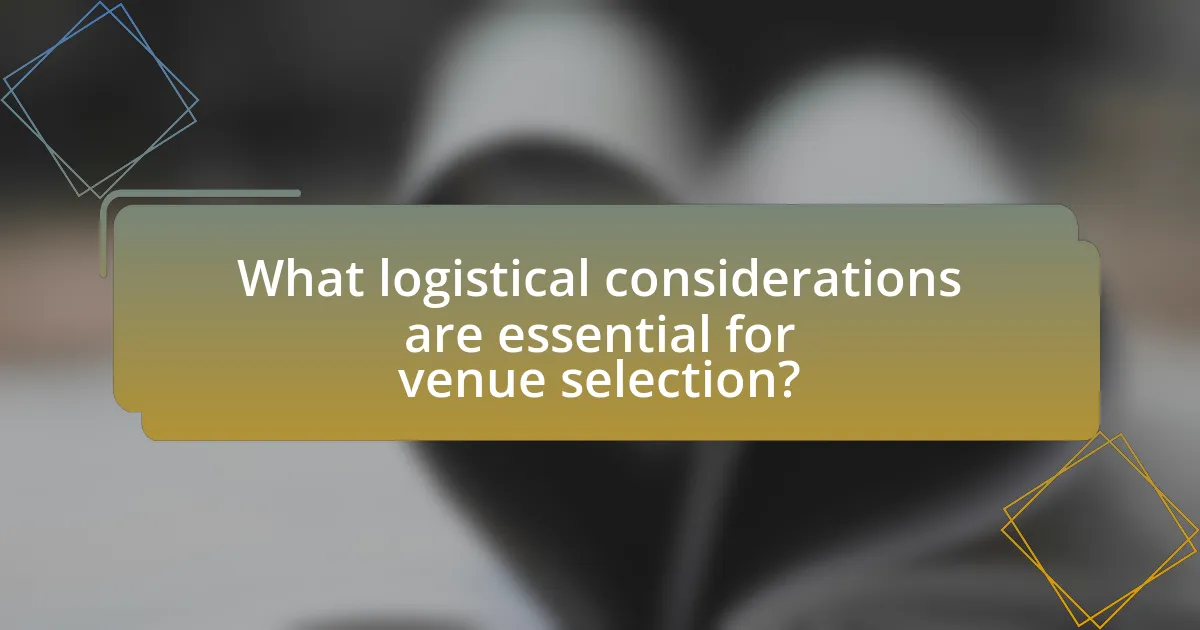Choosing the right venue for an event is crucial for its success, and several factors must be considered, including location, capacity, amenities, and budget. The article outlines how venue size impacts the atmosphere and attendee experience, while also detailing ideal capacities for various event types. It emphasizes the importance of accessibility, transportation options, and the venue’s ambiance in enhancing attendee satisfaction. Additionally, logistical considerations, financial implications, and best practices for finalizing venue choices are discussed, providing a comprehensive guide for performers seeking to secure the most suitable venue for their events.

What factors should you consider when choosing a venue for your event?
When choosing a venue for your event, consider factors such as location, capacity, amenities, and budget. The location should be accessible to your target audience, ideally near public transportation and parking options. Capacity must align with your expected attendance to ensure comfort and safety. Amenities, including audio-visual equipment, catering options, and Wi-Fi, can significantly enhance the event experience. Lastly, the budget should encompass not only the rental fee but also additional costs like insurance, staffing, and equipment rentals. These considerations are essential for ensuring a successful event that meets the needs of both organizers and attendees.
How does the size of the venue impact your event?
The size of the venue directly impacts the event’s atmosphere, capacity, and overall experience. A larger venue can accommodate more attendees, which may enhance networking opportunities and create a more dynamic environment, while a smaller venue fosters intimacy and engagement among participants. For instance, a study by the Event Marketing Institute found that 70% of attendees prefer smaller, more personal events for meaningful interactions. Therefore, selecting the appropriate venue size is crucial for aligning the event’s goals with the desired attendee experience.
What is the ideal capacity for different types of events?
The ideal capacity for different types of events varies based on the nature of the event. For corporate meetings, a capacity of 20 to 50 attendees is often ideal to facilitate interaction. For workshops, a range of 10 to 30 participants allows for effective engagement. Social events like weddings typically require venues that accommodate 100 to 300 guests, depending on the scale of the celebration. Concerts and large performances usually need capacities of 500 to several thousand attendees to ensure a vibrant atmosphere. These capacities are supported by industry standards, which suggest that smaller gatherings foster better communication, while larger events create a more dynamic experience.
How can you assess the layout and flow of a venue?
To assess the layout and flow of a venue, conduct a walkthrough to evaluate the spatial arrangement and movement patterns. During this walkthrough, observe key areas such as entrances, exits, seating arrangements, and pathways to determine how easily attendees can navigate the space. Research indicates that effective venue layouts enhance attendee experience by minimizing congestion and maximizing accessibility, as seen in studies by the Event Marketing Institute, which highlight the importance of flow in event success.
What role does location play in venue selection?
Location is a critical factor in venue selection as it directly influences accessibility, audience turnout, and overall event success. A strategically chosen location can enhance attendance by being easily reachable via public transport or major roadways, thereby attracting a larger audience. For instance, venues situated in urban centers typically experience higher foot traffic and visibility, which can lead to increased ticket sales and engagement. Additionally, the surrounding environment, including nearby amenities such as hotels and restaurants, can significantly impact the convenience for attendees, further affecting their decision to participate in the event.
How accessible should the venue be for your audience?
The venue should be fully accessible to accommodate all audience members, including those with disabilities. Accessibility features should include wheelchair ramps, accessible restrooms, and designated seating areas. According to the Americans with Disabilities Act (ADA), venues must meet specific standards to ensure equal access, which is crucial for inclusivity and compliance with legal requirements. Ensuring that the venue is accessible not only enhances the experience for all attendees but also expands the potential audience size, as approximately 1 in 5 people in the U.S. have some form of disability.
What transportation options should you consider?
When choosing a venue for your next event, consider transportation options such as public transit, rideshare services, parking availability, and proximity to major highways. Public transit systems, like buses and trains, can provide convenient access for attendees, while rideshare services like Uber and Lyft offer flexible options for those without personal vehicles. Adequate parking facilities are essential for guests driving to the venue, and being near major highways can facilitate easier access for out-of-town participants. These factors collectively enhance the overall accessibility of the event, ensuring higher attendance and satisfaction.
Why is the venue’s ambiance important for your event?
The venue’s ambiance is crucial for your event because it directly influences the mood and experience of attendees. A well-designed ambiance can enhance engagement, create a memorable atmosphere, and align with the event’s theme, thereby increasing overall satisfaction. Research indicates that 70% of event success is attributed to the environment, highlighting the importance of aesthetic elements such as lighting, decor, and layout in shaping perceptions and interactions.
How can the venue’s style align with your event theme?
The venue’s style can align with your event theme by ensuring that the architectural design, decor, and ambiance reflect the desired atmosphere of the event. For instance, a modern, sleek venue complements a contemporary theme, while a rustic barn setting enhances a vintage or country-themed event. Research indicates that 70% of event success is attributed to the venue’s alignment with the theme, as it influences guest experience and engagement. Therefore, selecting a venue that visually and atmospherically matches the event theme is crucial for creating a cohesive and memorable experience.
What elements contribute to a venue’s atmosphere?
The elements that contribute to a venue’s atmosphere include lighting, acoustics, decor, layout, and the overall ambiance. Lighting sets the mood and can influence emotions; for instance, dim lighting often creates a more intimate setting. Acoustics affect sound quality, which is crucial for performances, as poor acoustics can detract from the audience’s experience. Decor, including color schemes and furnishings, enhances visual appeal and can reflect the theme of the event. The layout determines how attendees interact with the space and each other, impacting social dynamics. Lastly, the overall ambiance, shaped by factors like cleanliness and staff professionalism, plays a significant role in how guests perceive the venue.

What logistical considerations are essential for venue selection?
Essential logistical considerations for venue selection include accessibility, capacity, location, and facilities. Accessibility ensures that all attendees can reach the venue easily, which is crucial for maximizing attendance. Capacity must align with the expected number of guests to avoid overcrowding or underutilization. The location should be convenient for the target audience, ideally near public transport and accommodations. Facilities, such as audio-visual equipment, restrooms, and catering options, must meet the event’s specific needs to ensure a smooth experience. These factors collectively contribute to the overall success of the event by facilitating attendee engagement and satisfaction.
How do amenities and services affect your venue choice?
Amenities and services significantly influence venue choice by directly impacting the overall experience and functionality of an event. For instance, venues that offer essential amenities such as audio-visual equipment, catering options, and adequate seating arrangements are often preferred because they enhance convenience and reduce logistical challenges. Research indicates that 70% of event planners prioritize venues with comprehensive services, as these features can lead to higher attendee satisfaction and smoother event execution. Therefore, the availability and quality of amenities and services are critical factors in selecting a venue that meets the specific needs of an event.
What technical equipment should be available at the venue?
The venue should have essential technical equipment including sound systems, lighting rigs, projectors, and high-speed internet access. Sound systems are crucial for clear audio delivery, while lighting rigs enhance the visual experience and set the mood. Projectors are necessary for presentations or visual displays, and high-speed internet access supports streaming and connectivity needs. These elements are standard in professional venues, ensuring that events run smoothly and meet audience expectations.
How important are catering and restroom facilities?
Catering and restroom facilities are crucial for the success of any event. Catering ensures that attendees are provided with food and beverages, which can enhance their overall experience and satisfaction. According to a survey by Eventbrite, 70% of attendees consider food quality as a key factor in their enjoyment of an event. Restroom facilities are equally important, as they directly impact attendee comfort and convenience. A lack of adequate restroom access can lead to negative experiences, with 60% of event-goers indicating that insufficient restroom facilities would deter them from returning to an event. Therefore, both catering and restroom facilities significantly influence attendee satisfaction and the overall success of an event.
What are the financial implications of choosing a venue?
Choosing a venue has significant financial implications, as it directly affects the overall budget of an event. The venue’s rental cost, which can vary widely based on location, size, and amenities, constitutes a primary expense. For instance, venues in urban areas typically charge higher rates due to demand and accessibility. Additionally, hidden costs such as insurance, security deposits, and service fees can further inflate the budget. According to a survey by Eventbrite, 30% of event planners reported that venue costs were their largest expense, highlighting the importance of careful financial planning when selecting a venue.
How can you determine your budget for venue rental?
To determine your budget for venue rental, first assess your overall event budget and allocate a specific percentage for venue costs, typically ranging from 20% to 30%. This allocation should consider all associated expenses, including rental fees, deposits, and additional services like catering or equipment. For example, if your total event budget is $10,000, you would set aside $2,000 to $3,000 for the venue. Additionally, research local venue prices to understand market rates, which can vary significantly based on location, size, and amenities. This data will help you make informed decisions and ensure that your venue choice aligns with your financial plan.
What additional costs should you anticipate?
When choosing a venue for your next event, you should anticipate additional costs such as service fees, equipment rentals, and insurance. Service fees can include charges for staff, cleaning, and security, which may not be included in the base rental price. Equipment rentals often encompass audio-visual gear, staging, and furniture, which can significantly increase overall expenses. Additionally, insurance costs are essential to cover potential liabilities, and venues may require proof of insurance before confirming a booking. These factors collectively contribute to the total cost of hosting an event at a venue.
How does the venue’s availability influence your planning?
The venue’s availability directly influences planning by determining the dates and times when an event can occur. If a venue is fully booked, it restricts options for scheduling, which can lead to rescheduling or selecting a different venue altogether. For instance, a study by Eventbrite indicates that 70% of event planners prioritize venue availability when finalizing event dates, highlighting its critical role in the planning process.
What strategies can you use to secure your preferred date?
To secure your preferred date for an event, book the venue as early as possible, ideally several months in advance. Early booking increases the likelihood of availability, as popular venues often fill their calendars quickly. Additionally, consider being flexible with your date options; if your first choice is unavailable, having alternative dates can help you secure a booking. Researching peak seasons and off-peak times can also provide insights into when venues are less likely to be booked, allowing for better chances of securing your desired date.
How can you handle potential scheduling conflicts?
To handle potential scheduling conflicts, prioritize clear communication with all parties involved. Establish a centralized calendar that all stakeholders can access to view availability and proposed dates. This approach minimizes misunderstandings and allows for real-time updates. Additionally, consider implementing a conflict resolution strategy, such as offering alternative dates or venues, to accommodate all parties. Research indicates that effective communication reduces scheduling conflicts by up to 30%, demonstrating the importance of proactive planning in event management.

What are the best practices for finalizing your venue choice?
The best practices for finalizing your venue choice include conducting thorough research, visiting the venue in person, and reviewing contracts carefully. Researching involves checking online reviews and ratings to gauge the venue’s reputation and suitability for your event. Visiting the venue allows you to assess the space, layout, and amenities firsthand, ensuring it meets your requirements. Reviewing contracts is crucial to understand the terms, conditions, and any hidden fees, which can prevent misunderstandings later. These practices are essential for making an informed decision that aligns with your event goals and budget.
How can you effectively evaluate potential venues?
To effectively evaluate potential venues, assess key factors such as location, capacity, amenities, and cost. Location is crucial; it should be accessible for your audience, ideally near public transport and parking. Capacity must align with your expected attendance to ensure comfort and safety. Amenities, including audio-visual equipment, seating arrangements, and catering options, should meet your event’s specific needs. Cost analysis involves not only the rental fee but also additional expenses like insurance, staffing, and equipment rentals. According to a survey by Eventbrite, 70% of event organizers prioritize venue accessibility and amenities when selecting a location, underscoring the importance of these evaluation criteria.
What criteria should you use for comparing venues?
When comparing venues, consider criteria such as location, capacity, amenities, cost, and accessibility. Location is crucial as it affects attendance; a venue in a central area is more likely to attract guests. Capacity must align with expected attendance to ensure comfort and safety. Amenities, including audio-visual equipment and catering options, enhance the event experience. Cost should be evaluated against the budget while considering what is included in the rental fee. Accessibility ensures that all guests can attend, including those with disabilities. These criteria collectively help in making an informed decision about the most suitable venue for an event.
How can site visits enhance your decision-making process?
Site visits enhance the decision-making process by providing firsthand experience of a venue’s layout, facilities, and ambiance. This direct observation allows decision-makers to assess whether the venue meets specific event requirements, such as capacity, accessibility, and technical capabilities. For instance, a study by the Event Marketing Institute found that 70% of event planners believe site visits significantly improve their ability to evaluate potential venues, leading to more informed choices. By experiencing the venue in person, planners can identify potential issues and advantages that may not be apparent through photographs or descriptions, ultimately leading to better event outcomes.
What questions should you ask venue managers before booking?
Before booking a venue, you should ask venue managers about availability, capacity, pricing, and included amenities. Specifically, inquire about the dates the venue is available to ensure it aligns with your event schedule. Confirm the maximum capacity to ensure it meets your audience size requirements. Discuss pricing details, including any deposits, cancellation policies, and additional fees. Additionally, ask about amenities such as audio-visual equipment, seating arrangements, and catering options, as these can significantly impact your event’s success. These questions will help you assess whether the venue meets your specific needs and budget.
How can you clarify terms and conditions of the rental agreement?
To clarify terms and conditions of the rental agreement, review the document thoroughly and seek clarification on any ambiguous language. Engaging in direct communication with the venue manager or landlord can provide specific explanations regarding responsibilities, fees, and policies. According to legal experts, clear communication reduces misunderstandings and ensures both parties have aligned expectations, which is crucial in rental agreements.
What should you know about cancellation policies and deposits?
Cancellation policies and deposits are critical components of venue agreements that dictate the terms under which a booking can be altered or terminated. Typically, cancellation policies outline the timeframe and conditions under which a performer can cancel their event without incurring penalties, often specifying a percentage of the deposit that may be forfeited based on how close to the event date the cancellation occurs. For example, a venue may require a 50% deposit upon booking and state that cancellations made more than 30 days in advance will incur no penalty, while those made within 30 days may result in the loss of the entire deposit. Understanding these terms is essential for performers to avoid unexpected financial losses and to make informed decisions when selecting a venue.
What tips can help you secure the right venue for your event?
To secure the right venue for your event, first, clearly define your event’s requirements, including capacity, location, and budget. This clarity allows you to narrow down options effectively. Research potential venues by checking online reviews, visiting their websites, and assessing their past events to ensure they align with your vision. Additionally, consider the venue’s accessibility, amenities, and technical capabilities, as these factors significantly impact the event’s success. Finally, engage in direct communication with venue managers to discuss availability, negotiate terms, and clarify any questions, ensuring that all details align with your event’s needs.
How can networking and referrals assist in your venue search?
Networking and referrals can significantly enhance your venue search by providing access to insider information and recommendations. Engaging with industry professionals can lead to discovering venues that may not be widely advertised, as many rely on word-of-mouth to promote their spaces. Referrals from trusted contacts can also lend credibility to a venue, as personal experiences shared by others can highlight the venue’s strengths and weaknesses. According to a survey by Eventbrite, 70% of event planners find venues through personal connections, underscoring the importance of networking in identifying suitable locations for events.
What resources are available for finding the perfect venue?
Online venue directories, event planning websites, and social media platforms are essential resources for finding the perfect venue. Websites like Eventbrite, Peerspace, and The Knot provide comprehensive listings of venues along with user reviews and ratings, which help in assessing suitability. Additionally, social media platforms such as Instagram and Facebook allow users to explore venues through photos and event pages, offering insights into the ambiance and style. Networking with local event planners and attending industry expos can also yield valuable recommendations and firsthand experiences, further aiding in the venue selection process.


